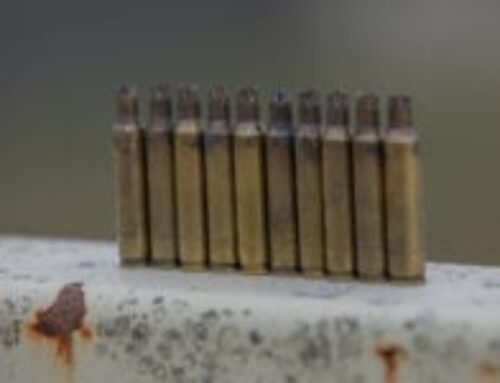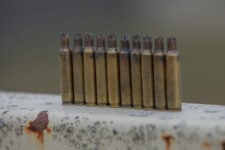An F-35 undergoes assembly at the Lockheed Martin factory in Fort Worth, Texas. (Lockheed Martin photo)
WASHINGTON — Months after defense giant Lockheed Martin took the extraordinary step of suing its supplier Howmet Aerospace over a dispute concerning the supply of titanium for the F-35, the two parties have quietly settled the case, according to federal court records reviewed by Breaking Defense.
“While we cannot discuss the settlement details, we reached an agreement to ensure the continued delivery of titanium and are working with Howmet and our subcontractors to maintain the F-35 production schedule,” Lockheed told Breaking Defense in a statement. Howmet declined to comment.
The legal row provides a rare, if somewhat limited, look inside the relationship between a mega prime contractor like Lockheed and one of its key suppliers.
Lockheed claimed in the lawsuit that Howmet cut off the supply of titanium in November 2023 after the aerospace giant refused to agree to higher prices, which Howmet said accounted for inflation and constrained global supply. Lockheed sued shortly thereafter, asking a federal judge to force Howmet to continue supplying titanium at previously set prices.
Howmet’s “failure to abide to its contractual agreement will cause unavoidable and substantial delays in Lockheed Martin’s delivery of F-35 aircraft to the United States, threatening national security and Lockheed Martin’s reputation and goodwill,” Lockheed said in court documents.
The issue at hand stems from a tightening global supply of titanium in the wake of Russia’s invasion of Ukraine, which has caused Western aerospace companies to seek alternatives to Russia’s VSMPO-Avisma— the world’s single largest titanium supplier, which has 25 percent of its shares held by state-owned defense conglomerate Rostec.
The US government and European Union have refrained from issuing sanctions on VSMPO-Avisma, and some major aerospace players such as Airbus and Bombardier continue to buy Russian titanium. However, other US aerospace firms, including Boeing, have vowed to stop buying Russian titanium for use on commercial jetliners, driving up the price for titanium from other sources.
According to Howmet’s court filings, the removal of Russian titanium “gave Japanese suppliers a dominant position in the market,” who subsequently “informed Howmet that they would no longer supply titanium sponge at previously agreed (and fixed) prices.” In other words, the overall shift in the market to Japanese suppliers meant Howmet faced much greater competition, and a subsequent price increase, for the material it needed.
Hitting back against Lockheed, Howmet accused the plane maker of “cavalier invocation of ‘national security interests’” and squeezing Howmet to pad its bottom line. Additionally, Howmet claimed that Lockheed refused to return contractually required scrap metal that Howmet could use to produce more titanium.
According to court records, Howmet asserted the price increase it was requesting from Lockheed would amount to a $17 million difference — a fraction of Lockheed’s sales. Howmet said it was on track to absorb roughly $58 million in losses on titanium sales through the end of 2024 due to rising prices.
After both parties presented evidence, the judge overseeing the case, Reed O’Connor, suggested that Lockheed had demonstrated its argument was likely to win the day. Still, he ruled against a request from Lockheed that would’ve compelled Howmet to keep up the titanium supply as the litigation unfolded, finding the larger company had not demonstrated the irreparable harm standard necessary to justify an injunction.
“Nonetheless, the Court recognizes that Lockheed is substantially likely to succeed on the merits of its breach of contract claim. Based on the evidence before the Court, it appears Howmet is intentionally breaching the parties’ contract — just as their Japanese suppliers did to them,” O’Connor wrote in late December.
After some more back-and-forth wrangling, the two parties entered into mediation in March, according to court records. On March 15, the court was notified the companies reached a settlement, bringing the litigation to an end. The settlement terms were not made public, and the case was formally dismissed on April 2.
It’s not clear to what extent the dispute may have impacted F-35 production, which is continuing despite the Pentagon’s ongoing freeze of deliveries. In denying Lockheed’s injunction request, O’Connor suggested there was not “widespread disruption” in the F-35’s supply chain due to the titanium issues.
Asked what impact the clash had on the program, F-35 Joint Program Office (JPO) spokesman Russ Goemaere told Breaking Defense today that “[t]he JPO is pleased that LM and Howmet have reached an agreement to their dispute and will work with LM to ensure that any potential impacts are mitigated and that aircraft production stays on plan.”
The settlement appears to resolve the dispute over titanium pricing and worries of hampered production, though Lockheed continues to struggle with supply chain issues for critical parts of the stealth fighter. Amid hardware shortages and continued software challenges for the jet’s Technology Refresh 3 (TR-3) upgrade, the Pentagon has postponed planned retrofits for older F-35s to an unspecified date, Breaking Defense previously reported.
Lockheed and the Pentagon are looking to end the delivery impasse for fighters equipped with TR-3 by July at the earliest, program head Air Force Lt. Gen. Mike Schmidt told lawmakers during an April hearing on Capitol Hill. Those aircraft would be delivered with an interim version of TR-3 that would limit them to training, according to Schmidt, who said full combat capabilities would likely not be available for another year at least.
Valerie Insinna contributed to this report.











